A dull coat, flaky skin, or constant itching can be a source of discomfort for your beloved canine companion and a worry for you as a pet parent. While many factors can contribute to these issues, one of the most significant and often overlooked solutions lies in your dog’s diet. Just like humans, dogs thrive on proper nutrition, and the right Good Dog Food For Skin And Coat can make a profound difference, transforming a lackluster appearance into a vibrant, healthy glow. Understanding the specific nutrients and ingredients that promote skin health and a shiny coat is key to helping your dog look and feel their best.
The Essential Nutrients for a Healthy Skin and Coat
The foundation of a healthy skin and coat begins at a cellular level, supported by a balanced intake of specific nutrients. Identifying these vital components in your dog’s food is crucial.
Omega-3 and Omega-6 Fatty Acids: The Dynamic Duo
These essential fatty acids are paramount for skin and coat health. They play a critical role in maintaining cell membrane integrity, reducing inflammation, and regulating oil production in the skin, leading to a supple skin barrier and a lustrous coat.
- Omega-3 Fatty Acids: Primarily found in fish oils (like salmon oil) and flaxseed, Omega-3s are renowned for their anti-inflammatory properties. They can help alleviate itching, reduce dryness, and improve the overall texture of your dog’s coat.
- Omega-6 Fatty Acids: These are also essential, but the balance with Omega-3s is key. Found in many vegetable oils and poultry fat, Omega-6s contribute to healthy skin cell growth and the shiny appearance of the fur.
A good dog food for skin and coat will feature a balanced ratio of these fatty acids, often with a higher concentration of Omega-3s to counteract inflammatory responses.
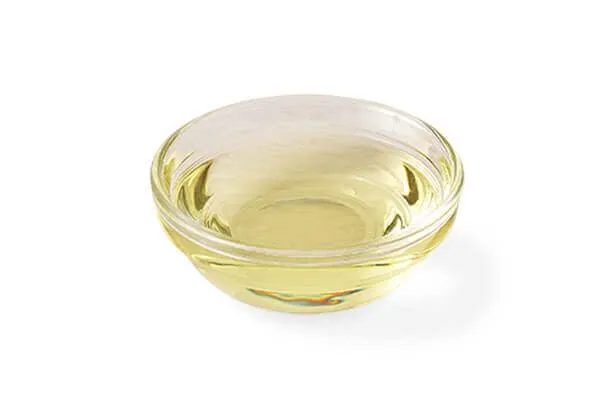 Liquid fish oil, a concentrated source of beneficial Omega-3s for a dog's shiny coat.
Liquid fish oil, a concentrated source of beneficial Omega-3s for a dog's shiny coat.
Quality Protein: Building Blocks for Hair Follicles
Hair is primarily made of protein, so a sufficient supply of high-quality protein is indispensable for strong hair growth and minimizing shedding. When a dog’s diet lacks adequate protein, their coat can become brittle, sparse, and dull. Look for foods where a real meat source is listed as the first ingredient.
- Excellent Protein Sources: Salmon, chicken, beef, lamb, and turkey are all beneficial. Salmon, in particular, offers the dual benefit of being a high-quality protein and a natural source of Omega-3s. Salmon meal is also a concentrated protein source, providing essential amino acids for muscle development and energy.
Vitamins and Minerals: The Supporting Cast
Beyond fatty acids and protein, a spectrum of vitamins and minerals works synergistically to maintain optimal skin and coat condition.
- Vitamin E: A powerful antioxidant that helps protect skin cells from damage, supports the immune system, and contributes to skin hydration.
- Zinc: Essential for cell division, protein synthesis, and immune function, zinc deficiency can lead to dry, flaky skin and a poor coat.
- Biotin (Vitamin B7): Often associated with hair growth and skin health, biotin plays a role in fatty acid metabolism.
- Vitamin A: Important for healthy skin cell turnover and immune function.
- Vitamin C: Another antioxidant that supports immune health and collagen production, crucial for healthy skin.
These nutrients, when supplied in appropriate amounts, ensure that your dog’s body has all the tools it needs to maintain healthy skin and a vibrant coat. If you notice concerning changes in your dog’s coat or skin health, it’s always wise to seek village veterinary care for a proper diagnosis and treatment plan.
Key Ingredients to Look For in Good Dog Food
When scrutinizing dog food labels for skin and coat benefits, specific ingredients stand out. These aren’t just fillers but active components contributing to your dog’s overall well-being.
Real Meat or Fish as the First Ingredient
The best dog foods for skin and coat health always list a named meat or fish as the very first ingredient. This indicates a high concentration of quality protein, which is fundamental for hair growth and skin cell repair. Ingredients like “salmon,” “chicken,” or “lamb” are preferred over generic terms like “meat meal” or “poultry by-product meal.”
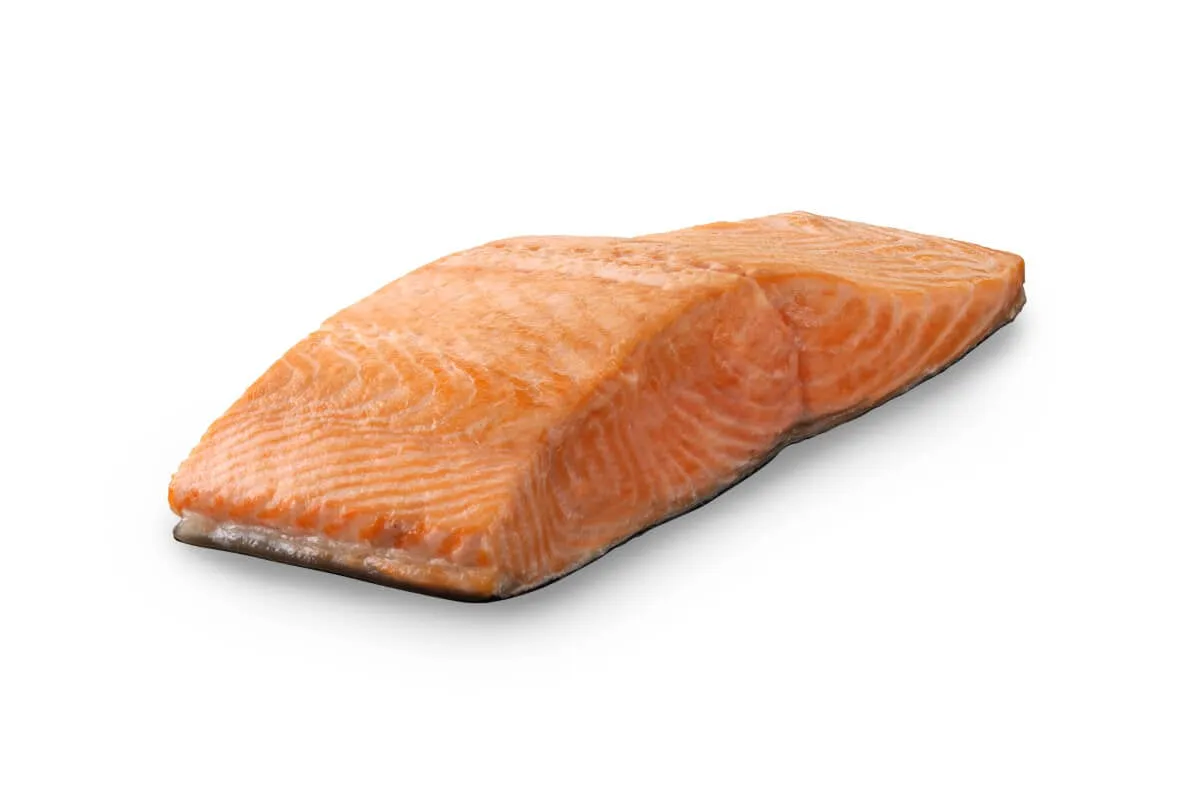 Fresh salmon fillets, a rich source of Omega-3 fatty acids for canine skin and coat health.
Fresh salmon fillets, a rich source of Omega-3 fatty acids for canine skin and coat health.
Healthy Fats and Oils
Beyond just Omega-3 and Omega-6, the type of fat matters. Look for sources like:
- Fish Oil: Rich in EPA and DHA, critical Omega-3s.
- Flaxseed: A plant-based source of Omega-3 (alpha-linolenic acid) and dietary fiber, which aids digestion and nutrient absorption, further supporting skin and coat health.
- Chicken Fat: A digestible source of Omega-6 fatty acids.
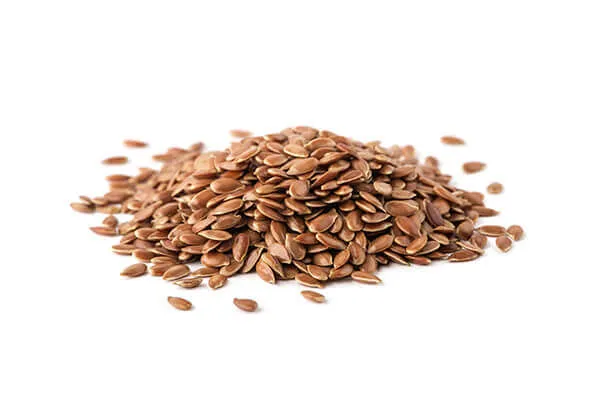 Whole flaxseeds, offering Omega-3s and fiber to support dog digestion and skin.
Whole flaxseeds, offering Omega-3s and fiber to support dog digestion and skin.
Wholesome Grains (or Alternatives) and Vegetables
While some dogs thrive on grain-free diets, wholesome grains can be beneficial. They provide complex carbohydrates for energy, B vitamins, and fiber, all contributing to overall health which reflects in the skin and coat.
- Brown Rice: A natural whole grain providing essential B vitamins, minerals, and complex carbohydrates.
- Oatmeal: Another wholesome grain rich in B vitamins, offering sustained energy.
- Pumpkin: Not just a great fiber source for healthy digestion, pumpkin is also rich in vitamins, minerals, and antioxidants.
- Cranberries: Packed with antioxidants, vitamins C, E, and K, and manganese, they support general health, including immunity, which indirectly benefits skin health.
Additionally, many high-quality formulas avoid common irritants like corn, wheat, soy, dairy, or eggs, which can sometimes exacerbate skin sensitivities in predisposed dogs. If your dog exhibits concerning symptoms, such as the signs of a dog that has been poisoned or other severe health issues, immediate urgent care for dogs is paramount.
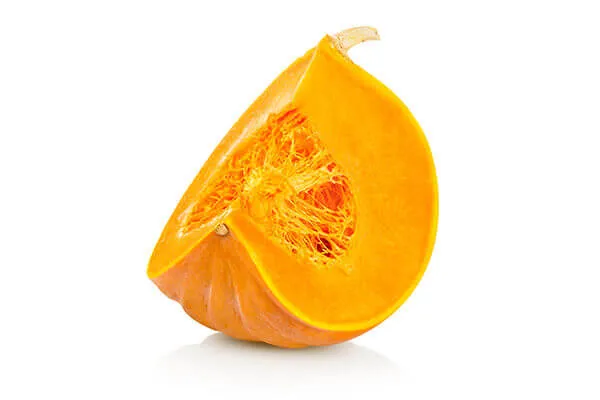 A sliced pumpkin, symbolizing natural vitamins and dietary fiber for canine health.
A sliced pumpkin, symbolizing natural vitamins and dietary fiber for canine health.
What to Avoid in Dog Food for Skin and Coat Health
Just as important as what to look for is what to avoid. Certain ingredients can trigger sensitivities or provide little to no nutritional value for skin and coat health.
- Artificial Flavors, Colors, and Preservatives: These additives offer no nutritional benefit and can sometimes lead to allergic reactions or sensitivities that manifest as skin issues.
- By-Product Meals: While not all by-products are harmful, vague terms like “meat by-product meal” can indicate a lower quality protein source with inconsistent nutritional content.
- Excessive Fillers: Ingredients like corn, wheat, and soy are often used as inexpensive fillers. While not inherently bad for all dogs, they can be common allergens and may not provide the concentrated nutrition needed for optimal skin and coat health.
Recognizing Skin and Coat Issues in Your Dog
A dog’s skin and coat often serve as indicators of their overall health. Recognizing the signs of an unhealthy coat or skin issue is the first step toward finding a solution.
- Dull or Brittle Coat: A healthy coat should be soft, shiny, and pliable. A dull, dry, or brittle coat often signals a lack of essential fatty acids or protein.
- Excessive Shedding: While shedding is natural, excessive, non-seasonal shedding, especially accompanied by bare patches, can be a red flag.
- Dry, Flaky Skin: Dandruff or dry, scaly patches are common signs of dietary deficiencies or environmental dryness.
- Itching, Scratching, or Licking: Persistent itching, scratching, or excessive licking of certain areas can indicate allergies, skin irritation, or parasites.
- Hot Spots: Red, inflamed, moist lesions often caused by continuous licking or scratching, which can be triggered by underlying skin conditions.
If you observe these symptoms, consulting your veterinarian is crucial to rule out underlying medical conditions or allergies. For instance, if you suspect something serious like signs of parvo in a 6 month old dog, prompt veterinary attention from an madison emergency vet is vital.
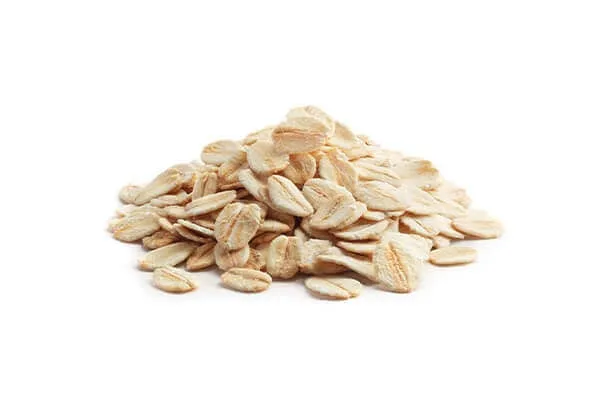 Rolled oats, a source of wholesome carbohydrates and B vitamins for dogs.
Rolled oats, a source of wholesome carbohydrates and B vitamins for dogs.
Transitioning to a New Diet and Monitoring Progress
Once you’ve selected a good dog food for skin and coat, the transition should be gradual to avoid upsetting your dog’s digestive system. Over 7-10 days, slowly mix the new food with the old, gradually increasing the percentage of the new food.
- Days 1–4: 25% new food, 75% old food
- Days 5–8: 50% new food, 50% old food
- Days 9–11: 75% new food, 25% old food
- Days 12–14: 100% new food
Be patient and consistent. It can take several weeks, or even a few months, to see noticeable improvements in your dog’s skin and coat. Look for reduced itching, less flakiness, a softer texture, and an overall shinier appearance. Ensure fresh, clean water is always available, as hydration also plays a role in skin health.
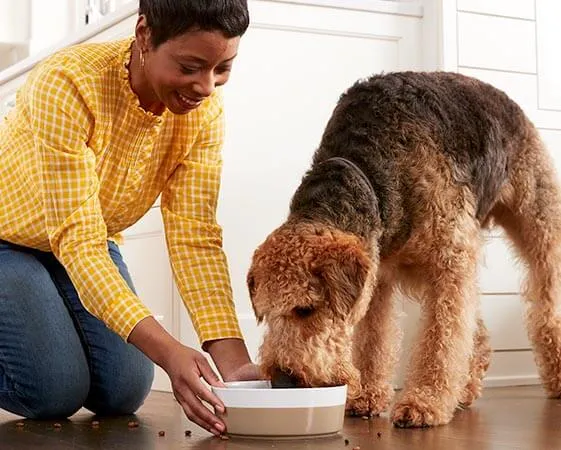 A happy dog enjoying a bowl of nutritious kibble, promoting overall well-being.
A happy dog enjoying a bowl of nutritious kibble, promoting overall well-being.
Conclusion
Choosing the right dog food is one of the most impactful decisions you can make for your pet’s health, particularly when it comes to their skin and coat. By prioritizing foods rich in essential fatty acids, high-quality proteins, and beneficial vitamins and minerals, you provide the foundational support your dog needs to thrive. A truly good dog food for skin and coat goes beyond mere sustenance; it’s a proactive step towards a happier, healthier, and more radiant companion. Always consult with your veterinarian to ensure any dietary changes are appropriate for your dog’s specific needs and health conditions.
